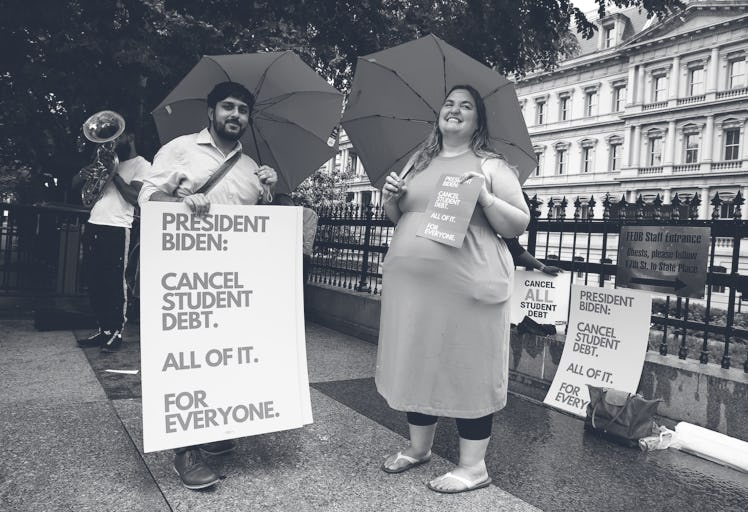Student Loan Interest Is A Massive Problem. There's A Plan To Ease It
A 2018 estimate found that fewer than a quarter of student loan borrowers were paying down their principal loans.

If your student loan balance over the years has seemed to magically increase despite regular, on-time payments, and leave you owing more than you originally borrowed, you aren’t alone. It’s not magic, or a curse, even if it feels like one. It’s interest capitalization, and it’s a sneaky way to increase borrowers' balances so that it feels like you’ll never get out from beneath your student loan debt — even if you’ve already paid more than you borrowed in the first place. But now, there’s a plan to ease it.
Despite campaign promises to address the student loan crisis, forgive at least $10,000 in debt per borrower, and consider more thorough loan forgiveness, the Biden Administration has continued to chip away at the crisis piece by piece. While the Biden admin looks at widespread forgiveness and cancels broad swathes of debt for people who were defrauded at for-profit colleges, they’ve also looked at another part of the problem that has made the crisis so bad: student loan interest. This time, by addressing the insidious process of interest capitalization, the government plans to limit the way interest can be added to principal loan balances — a process called interest capitalization.
What is Interest Capitalization?
Interest capitalization occurs when unpaid interest is rolled into your principal balance. This usually happens as a result of periods of deferment (when you don’t make loan payments for up to three years and you might have no interest on the loan accrues) or forbearance (when you temporarily suspend loan payments during times of financial stress but interest on the loan grows) or when you consolidate or refinance your student loans.
When you pay your loan every month, payments are first allocated to any fees you owe, then to interest, then to your principal balance, the amount you actually borrowed. After forbearance, deferment, consolidation, or refinancing, the amount owed in interest can be added to the principal amount, resulting in an increased principal balance and borrowers paying interest on money they never borrowed.
This tactic, which is unique to the student loan debt industry and not seen in other debtors industries — can you imagine this happening to your mortgage, for example? — can add thousands of dollars to balances and leave borrowers paying interest on interest for years after the original principal amount has been paid off.
The Biden Administration has a plan to address interest capitalization. While it’s helpful for future borrowers, it might not be enough for borrowers who have already experienced this ploy.
How Many People Have Experienced Interest Capitalization?
Department of Education survey data shows that 27% of people who started college in the 2003-2004 school year had larger balances than their original borrowed amount 12 years later. A different 2018 estimate found that fewer than a quarter of people with student loans were actually repaying their principal loans. That means that over 75% of students could just be paying down their interest and that people’s debt is continuing to grow.
Unsurprisingly, interest capitalization hurts marginalized communities the most — Black and low-income borrowers were disproportionately affected.
The data also shows that 80% of Black borrowers, 64% of Native American borrowers, and 59% of Latinx borrowers had loans that went into forbearance, increasing the likelihood of those borrowers experiencing interest capitalization.
Biden’s Plan for Student Loan Interest Capitalization
To address the burgeoning student loan crisis, the Biden Administration is planning to limit the loans that student loan interest capitalization can be applied to in the future. The process won't be completely done away with, but it will be removed for loans that meet certain criteria.
Capitalization will no longer occur for:
- Federal loans coming out of forbearance
- Federal loans in default
- Federal loans coming out of a grace period
- Borrowers coming out of certain types of income-driven repayment plans like Pay As You Earn
Federal loans that have been paused as a result of Covid-19 pandemic protections will also not be capitalized when repayment begins later this year.
Interest capitalization will still be a problem for unsubsidized loans coming out of deferment, loans coming out of older income-based repayment plans, and if it’s required by specific statutes. Also, unfortunately, the changes will not be retroactive, meaning that if you’ve already experienced interest capitalization, you will still be required to pay back what you currently owe, even if your balance is inflated due to interest capitalization.
When Will the Changes Take Place?
The plan will enter a 30-day public comment period and is expected to be finalized on November 1, 2022. The changes will take effect in July 2023. Biden Administration documentation states that this plan will decrease overall federal revenue and increase taxpayer burden. “Because there would be fewer situations in which interest is capitalized, this proposal would result in a loss in revenue and therefore would increase costs for the Government and consequently U.S. taxpayers. However, the proposal is expected to result in lower total payments over time for borrowers, thereby increasing the likelihood that borrowers would repay their loans in full. Given this benefit, the Department believes that the benefits for borrowers exceed these costs and justify the change.”